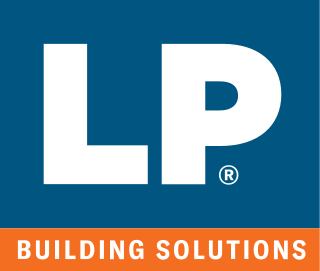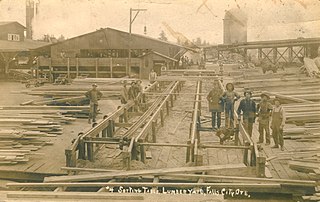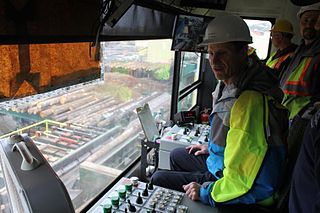
Lumber is wood that has been processed into uniform and useful sizes, including beams and planks or boards. Lumber is mainly used for construction framing, as well as finishing. Lumber has many uses beyond home building. Lumber is referred to as timber in the United Kingdom, Europe, Australia, and New Zealand, while in other parts of the world the term timber refers specifically to unprocessed wood fiber, such as cut logs or standing trees that have yet to be cut.

The Forest Stewardship Council GmbH (FSC) is an international non-profit, multistakeholder organization established in 1993 that promotes responsible management of the world's forests via timber certification. This organization uses a market-based approach to transnational environmental policy.

Louisiana-Pacific Corporation (LP) is an American building materials manufacturer. The company was founded in 1973 and LP pioneered the U.S. production of oriented strand board (OSB) panels. Currently based in Nashville, Tennessee, LP is the world's largest producer of OSB and manufactures engineered wood building products. LP products are sold to builders and homeowners through building materials distributors and dealers and retail home centers.

Certified wood and paper products come from responsibly managed forests – as defined by a particular standard. With third-party forest certification, an independent standards setting organization (SSO) develops standards for good forest management, and independent auditing companies issue certificates to forest operations that comply with those standards.
Kleercut is the name of a former campaign conducted by Greenpeace, the Natural Resources Defense Council, and others towards Kimberly-Clark. It lasted from 2004 to 2009. Kimberly-Clark is the world’s largest manufacturer of tissue products, most notably the Kleenex brand. According to its annual environmental report, the company purchases over 3.1 million metric tonnes of virgin fiber from logging companies annually. The Kleercut campaign claims that this fiber is derived from wood pulp from old growth forests. Kimberly-Clark claims that the forests in question are largely cut for timber. The Kleercut campaign claims that Kimberly-Clark support the clearcutting of such forests in Canada and the United States, including forests habitat for wolverine and threatened wildlife the woodland caribou. Kimberly-Clark has responded that many of its supplies are certified by the Sustainable Forestry Initiative or the Canadian Standards Association.

A lumber yard is a location where lumber and wood-related products used in construction and/or home improvement projects are processed or stored. Some lumber yards offer retail sales to consumers, and some of these may also provide services such as the use of planers, saws and other large machines.

The Sustainable Forestry Initiative (SFI) is a sustainability organization operating in the U.S. and Canada that works across four pillars: standards, conservation, community, and education. SFI was founded in 1994 by the American Forest & Paper Association (AF&PA). SFI is the world's largest single forest certification standard by area. SFI is headquartered in Ottawa and Washington, D.C.

A forest product is any material derived from forestry for direct consumption or commercial use, such as lumber, paper, or fodder for livestock. Wood, by far the dominant product of forests, is used for many purposes, such as wood fuel or the finished structural materials used for the construction of buildings, or as a raw material, in the form of wood pulp, that is used in the production of paper. All other non-wood products derived from forest resources, comprising a broad variety of other forest products, are collectively described as non-timber forest products (NTFP). Non-timber forest products are viewed to have fewer negative effects on forest ecosystem when providing income sources for local community.

Reclaimed lumber is processed wood retrieved from its original application for purposes of subsequent use. Most reclaimed lumber comes from timbers and decking rescued from old barns, factories and warehouses, although some companies use wood from less traditional structures such as boxcars, coal mines and wine barrels. Reclaimed or antique lumber is used primarily for decoration and home building, for example for siding, architectural details, cabinetry, furniture and flooring.

Collins is a family-owned American forest products company that began in operations July 28, 1855. Headquartered in Portland, Oregon, Collins was the first privately owned forest products company in the United States to have all of its hardwood and softwood forests certified by the Forest Stewardship Council (FSC). In addition to its forests and sawmills, Collins also manufactures siding and trim, particleboard, hardwood, and softwood lumber, and operates retail hardware and lumber yards in northern California. Divisions include: Collins Pine Company, Kane Hardwood, Collins Hardwood LLC, Collins Products LLC, Collins Builders Supply, and the Almanor Railroad.
Variable retention is a relatively new silvicultural system that retains forest structural elements for at least one rotation in order to preserve environmental values associated with structurally complex forests.
Australian Paper is an Australian manufacturer of office, printing and packaging papers. The company manufactures more than 600,000 tonnes of paper annually for Australia, New Zealand and other export markets. Australian Paper was purchased from Paperlinx by Nippon Paper Industries in June 2009.

Sustainable flooring is produced from sustainable materials that reduces demands on ecosystems during its life-cycle. This includes harvest, production, use and disposal. It is thought that sustainable flooring creates safer and healthier buildings and guarantees a future for traditional producers of renewable resources that many communities depend on. Several initiatives have led the charge to bring awareness of sustainable flooring as well as healthy buildings. Below are examples of available, though sometimes less well-known, eco-friendly flooring options. The Asthma and Allergy Foundation of America recommends those with allergies to dust or other particulates choose flooring with smooth surfaces – such as hardwood, vinyl, linoleum tile or slate.
Kruger Inc. is a Canadian private company which manufactures publication papers, lumber and other wood products, corrugated cartons from recycled fibres, green and renewable energy, and wines and spirits. Kruger Inc. operates facilities in Québec, Ontario, British Columbia, Newfoundland and Labrador, and the United States. KP Tissue, Inc. is a separate, publicly traded holding company, headquartered in Mississauga, Ontario, Canada.
Clearwater Paper Corporation is an American pulp and paperboard manufacturer. The company was created on December 9, 2008, via a spin-off from Potlatch Corporation and is headquartered in Spokane, Washington.

HS Timber Group is an Austrian-based company operating in the wood processing industry, lumber trading and bioenergy production. It is one of the leading woodworking businesses in Europe and employs more than 2,700 people in its headquarters and seven global production units.
Interfor Corporation is one of the largest lumber producers in the world. The company's sawmilling operations have a combined manufacturing capacity of over 5.2 billion board feet of lumber with sales to North America, Asia-Pacific and Europe. Interfor is based in Vancouver, BC and employs approximately 5200 people. In May 2014, Interfor opened its corporate office for the USA south-east region at Peachtree City, Georgia.

Greenheart Group is a listed multi-national forestry company based in Hong Kong.

Futuro Forestal S.A. is a German-Panamanian reforestation company that operates in Latin America. Established in 1994 in Panama, it is headquartered in Panama City. Futuro Forestal focuses on impact investment management in the tropical forestry industry. To date, the company has planted over 8,000 hectares of teak and mixed hardwood plantations on deforested pastureland, often under the Forest Stewardship Council (FSC) standard.
The wood industry or timber industry is the industry concerned with forestry, logging, timber trade, and the production of primary forest products and wood products and secondary products like wood pulp for the pulp and paper industry. Some of the largest producers are also among the biggest owners of forest. The wood industry has historically been and continues to be an important sector in many economies.











